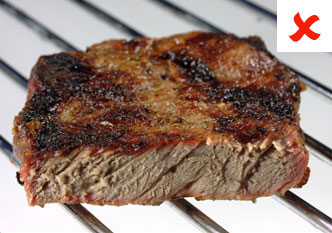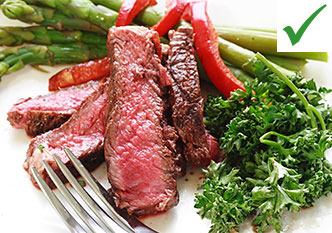Cooked Meat & Cancer
National Cancer Institute |
Cooking animal products at high temperature contributes to cancer. Many high temperature cooking methods such as roasting, frying, broiling, and barbecuing to char, etc. causes fats to produce carcinogenic substances, including acrolein, hydrocarbons, nitrosamines, and benzopyrene (one of the most dangerous carcinogens known to man).
Researchers at the National Cancer Institute found that human subjects who ate beef rare or medium-rare had less than 1/3 the risk of stomach cancer than those who ate beef medium-well or well done.
Damaged Proteins
Cooking animal products at high temperatures damages the protein content in these foods. All proteins we consume must first be broken down into individual amino acids for our body to assimilate them. Irreversible chemical changes take place when a protein reaches high temperatures, fusing the amino acids together and preventing them from being properly broken down by the body. Undigested proteins can also contribute to various health conditions such as arthritis and allergies.
Here are just some of the chemicals that are created as a by-product of high-temperature meat cooking:
Heterocyclic Amines (HCA's)
In 2005, the federal government officially added HCA's to its list of cancer-causing agents and has linked it to colorectal, stomach, pancreatic, and breast cancers. High amounts of HCA's can also cause cancer in animals.
HCA's are components of cigarette smoke and car exhaust fumes and are created when the protein in animal products (meat, fish, poultry, and eggs) are cooked at high temperatures. The creatine found in animal foods can react with free amino acids and sugars during cooking to form a variety of HCA's (these are not, however, formed when cooking plant foods).
Columbia Analytical Services tested 10 samples of the following food items using a validated and published analytical method. Every single sample from each restaurant tested positive for PhiP, a compound of HCA's that are found in grilled meats:
- McDonalds: Caesar Salad w/Grilled Chicken
- Applebee's: Grilled Italian Chicken Caesar Salad / Honey Grilled Chicken Entree
- Burger King: Tendergrill Chicken Sandwich
- Chick-fil-A: Chargrilled Chicken Sandwich
- Chili's: Grilled Caribbean Chicken Salad / Guiltless Chicken Platter Entree
- Outback Steakhouse: Chicken on the Barbie
- TGI Friday's: Cobb Salad w/Grilled Chicken & Grilled Chicken Flavor Shots Entree
While eating muscle meat raw may be the only way to completely avoid HCA's, the National Cancer Institute states that cooking meat below 212°F (100°C), creates "negligible amounts" of HCAs.
 |
 |
Polycyclic Aromatic Hydrocarbons (PAHs)
These are toxic compounds formed by the incomplete burning of carbon-containing substances in food, or in fat heated above 392°F. They are present in grilled or charred meat, poultry, and fish. They also form in toasted grains and in anything fried in oil. PAHs are considered mutagens (meaning that they damage DNA) and are linked to lung, skin, and genito-urinary cancers. They are also components of cigarette-smoke and car-exhaust fumes, a known industrial pollutant, and are classed as carcinogenic.
Advanced Glycation End-Products (AGEs)
AGEs are created during the browning that occurs when sugars combine with amino acids. They are found in foods that have been browned (e.g. grilled and fried meats), although AGEs form during the browning of any foods. They occur when sugars combine with amino acids during the browning process.
Compare the AGE content in the following foods:
1 serving of fresh, raw fruits or vegetables = 10-50 AGEs
3 oz. grilled sausage > 10,000 AGEs
3 oz. grilled tofu > 3,000 AGEs
AGEs impair bodily functions, increase the aging process, and contribute to chronic inflammatory diseases and other serious health conditions including arthritis, cardiovascular disease, neuropathy, diabetes, stroke, kidney disease, Alzheimer's , and many others.
Excretion of dietary AGEs is impaired in diabetics, and lowering AGE intake may greatly reduce the impact of AGEs in patients who suffer from diabetes.
More about how cooking affects food...
What Can You Do?
Buying organic meat that has been pasture-raised (free-range), and not preparing it with high temperature cooking (212° or less) is the best defense against purchasing unhealthy meat and damaging it with cancer-causing compounds. Game meat is naturally free range, and includes boar, bison, caribou, pheasant, deer, duck, and elk.
RELATED ARTICLES
- Meet your meat - today's meat is not what you think it is
- 7 dangers of eating factory-farmed meat
- Eating meat responsibly
- The sordid seafood industry
- Environmental impact of factory farming
- Cooked meat & cancer
- Serious health dangers of pesticides in food
- Pesticides in our home and garden
- What GMOs are & why you should avoid them
- How cooking affects food
- Pasteurized vs. raw dairy
- The health benefits of raw dairy
- The FDA: Failure to protect our food on a mass scale
- Food pyramids & food politics


